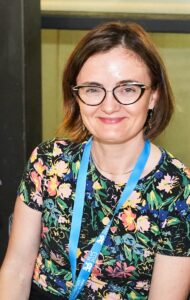 Rediet Abebe is a junior fellow at the Harvard Society of Fellows and an Andrew Carnegie Fellow. Her research examines the interaction of algorithms and inequality, with a focus on contributing to the scientific foundations of this area. Abebe has also co-founded numerous organizations, including the ACM Conference on Equity and Access in Algorithms, Mechanisms, and Optimization (EAAMO), and the associated international research initiative. Abebe is the recipient of numerous awards and honours, including the Hector Endowed Fellowship by the European Laboratory for Learning and Intelligent Systems (ELLIS), MIT Technology Fellows 35 Innovators under 35, the ACM SIGKDD Dissertation Award, and an honorable mention for the ACM SIGecom Dissertation Award. Abebe is currently leading several large-scale evaluations of ML systems used in commercial, legal, and policy contexts.
Rediet Abebe is a junior fellow at the Harvard Society of Fellows and an Andrew Carnegie Fellow. Her research examines the interaction of algorithms and inequality, with a focus on contributing to the scientific foundations of this area. Abebe has also co-founded numerous organizations, including the ACM Conference on Equity and Access in Algorithms, Mechanisms, and Optimization (EAAMO), and the associated international research initiative. Abebe is the recipient of numerous awards and honours, including the Hector Endowed Fellowship by the European Laboratory for Learning and Intelligent Systems (ELLIS), MIT Technology Fellows 35 Innovators under 35, the ACM SIGKDD Dissertation Award, and an honorable mention for the ACM SIGecom Dissertation Award. Abebe is currently leading several large-scale evaluations of ML systems used in commercial, legal, and policy contexts.
 Bahar Asgari is an assistant professor in the Department of Computer Science at the University of Maryland, College Park (UMD), with a joint appointment at UMIACS and an affiliation withthe Department of Electrical and Computer Engineering at UMD. Prior to joining UMD, she spent a year on Google’s Systems and Services Infrastructure team, where she focused on improving the performance of Google’s systems and establishing strategies to balancevarious trade-offs, particularly in optimizing memory utilization, cost, and reliability. She earned her Ph.D. in Electrical and Computer Engineering from Georgia Tech in 2021. Asgari is a recipient of the DoE Early Career Award in 2023 and received the Teaching Excellence Award in the Department of Computer Science at UMD in 2024. She was also selected as a Rising Star in EECS in 2019. Her research group at UMD, the Computer Architecture and Systems Lab (CASL), is dedicated to shaping the future of computing, with a primary goal of enabling intelligent, dynamically reconfigurable architectures.
Bahar Asgari is an assistant professor in the Department of Computer Science at the University of Maryland, College Park (UMD), with a joint appointment at UMIACS and an affiliation withthe Department of Electrical and Computer Engineering at UMD. Prior to joining UMD, she spent a year on Google’s Systems and Services Infrastructure team, where she focused on improving the performance of Google’s systems and establishing strategies to balancevarious trade-offs, particularly in optimizing memory utilization, cost, and reliability. She earned her Ph.D. in Electrical and Computer Engineering from Georgia Tech in 2021. Asgari is a recipient of the DoE Early Career Award in 2023 and received the Teaching Excellence Award in the Department of Computer Science at UMD in 2024. She was also selected as a Rising Star in EECS in 2019. Her research group at UMD, the Computer Architecture and Systems Lab (CASL), is dedicated to shaping the future of computing, with a primary goal of enabling intelligent, dynamically reconfigurable architectures.
Meeyoung (Mia) C ha is a leading AI and data science researcher dedicated to applying technology for societal benefit. She is a Scientific Director at the Max Planck Institute for Security and Privacy (MPI-SP), an Adjunct Faculty at Ruhr University Bochum (RUB) in Germany, and a Professor at the Korea Advanced Institute of Science and Technology (KAIST). Her research focuses on data science and computational social science, particularly in areas such as misinformation, poverty mapping, fraud detection, and human-machine interactions. Her work has earned widespread recognition, including Best Paper Awards, Test-of-Time Awards, the Hong Jin-Ki Creator Award, the Korean Young Information Scientist Award, and the ACM Distinguished Member status.
ha is a leading AI and data science researcher dedicated to applying technology for societal benefit. She is a Scientific Director at the Max Planck Institute for Security and Privacy (MPI-SP), an Adjunct Faculty at Ruhr University Bochum (RUB) in Germany, and a Professor at the Korea Advanced Institute of Science and Technology (KAIST). Her research focuses on data science and computational social science, particularly in areas such as misinformation, poverty mapping, fraud detection, and human-machine interactions. Her work has earned widespread recognition, including Best Paper Awards, Test-of-Time Awards, the Hong Jin-Ki Creator Award, the Korean Young Information Scientist Award, and the ACM Distinguished Member status.

Christina Giannoula is Postdoctoral Researcher at the University of Toronto, who will join the faculty at the MPI for Software Systems in January 2026. She is also an affiliated researcher with the SAFARI research group at ETH Zurich, working with Prof. Onur Mutlu. Her research spans the intersection of computer architecture, systems software and high performance computing, focusing on high performance, energy efficiency and programmability. Her current research interests include hardware-software co-design for cutting-edge applications, emerging memory technologies such as processing-in-memory and systems for machine learning. Christina received her Ph.D. in 2022 from the School of Electrical and Computer Engineering (ECE) at the National Technical University of Athens (NTUA), Greece. She has been recognized with several awards and fellowships for her Ph.D. research, including a three-year Ph.D. Fellowship from the Hellenic Foundation for Research and Innovation (HFRI) and the General Secretariat for Research and Technology (GSRT). For her Postdoctoral research, she has received research grants from the Vector Institute for Artificial Intelligence and has been recognized as a Rising Star in EECS (Electrical Engineering and Computer Sciences) and a Rising Star in MLSys (Machine Learning Systems) in 2024. For more information, please visit her website at https://cgiannoula.github.io/.

Krishna Gummadi is a scientific director at the Max Planck Institute for Software Systems (MPI-SWS) in Germany. He also holds a professorship at the University of Saarland. He received his Ph.D. (2005) and B.Tech. (2000) degrees in Computer Science and Engineering from the University of Washington and the Indian Institute of Technology, Madras, respectively. Krishna’s current research focus is on understanding and building fair, accountable, transparent, and explainable social computing systems. Krishna’s work on fair machine learning, online social networks and media, Internet access networks, and peer-to-peer systems has been widely cited and his publications have received over 10 best/outstanding papers awards, including the Test-of-Time Awards at ACM SIGCOMM and AAAI ICWSM and Privacy Awards at PETS and CNIL-INRIA. He received an ERC Advanced Grant in 2017 to investigate “Foundations for Fair Social Computing”.

Justin Hsu is an associate professor of Computer Science at Cornell University. He was previously an assistant professor at UW–Madison and a postdoc at Cornell and UCL, after receiving his doctorate in Computer Science from the University of Pennsylvania. His research focuses on formal verification of probabilistic programs and quantitative programs, including protocols from differential privacy and cryptography, algorithms from numerical analysis, and mechanisms from game theory. His work has been recognized by the EATCS Presburger Award, a NSF CAREER award, a SIGPLAN John C. Reynolds Doctoral Dissertation award, distinguished paper awards from POPL and CAV, and industrial awards from Facebook.

Manuel Gomez Rodriguez is a tenured faculty at the Max Planck Institute for Software Systems (MPI-SWS). His research interests lie in the development of human-centric machine learning models and algorithms. He has co-authored over 50 publications in top-tier conferences (NeurIPS, ICML, UAI, AISTATS, AAAI, KDD, WWW) and journals (Nature, PNAS, Nature Communications, Management Science, JMLR, TMLR). Manuel is an ELLIS Fellow and has received several recognitions for his research, including an ERC Consolidator Grant, an ERC Starting Grant, an outstanding Paper Award at NeurIPS and a Best Research Paper Honorable Mention at KDD and WWW. Manuel holds a M.S. and a Ph.D. in Electrical Engineering from Stanford University and a B.S. in Electrical Engineering from University Carlos III in Madrid, Spain.
Abhin av Shrivastava is an Associate Professor of Computer Science at the University of Maryland, College Park, with an appointment in UMIACS and an affiliate appointment in ECE. His research focuses on computer vision and machine learning. Abhinav’s past work has received best paper awards at WACV and best paper finalist at CVPR. His research is supported byNSF, DARPA, IARPA, and gifts from Honda, Dolby, Meta, Google, and Adobe. He has received the NSF CAREER, the Amazon Research Award (twice), and Google Faculty Award. Before Maryland, he got his PhD in Robotics from CMU and spent a year at Google Research.
av Shrivastava is an Associate Professor of Computer Science at the University of Maryland, College Park, with an appointment in UMIACS and an affiliate appointment in ECE. His research focuses on computer vision and machine learning. Abhinav’s past work has received best paper awards at WACV and best paper finalist at CVPR. His research is supported byNSF, DARPA, IARPA, and gifts from Honda, Dolby, Meta, Google, and Adobe. He has received the NSF CAREER, the Amazon Research Award (twice), and Google Faculty Award. Before Maryland, he got his PhD in Robotics from CMU and spent a year at Google Research.
Alexa ndra Silva is a Professor in the Computer Science Department at Cornell University. Previously, she was a Royal Society Wolfson Fellow and Professor of Algebra, Semantics, and Computation at University College London. Her main research focuses on the modular development of specification languages and algorithms for models of computations. A lot of her work is developed from the unifying perspective offered by coalgebra, a mathematical framework established in the last decades.
ndra Silva is a Professor in the Computer Science Department at Cornell University. Previously, she was a Royal Society Wolfson Fellow and Professor of Algebra, Semantics, and Computation at University College London. Her main research focuses on the modular development of specification languages and algorithms for models of computations. A lot of her work is developed from the unifying perspective offered by coalgebra, a mathematical framework established in the last decades.
